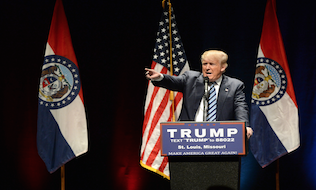

The U.S. election trail reached a fever pitch this past weekend on the heels of Donald Trump’s leaked audio tapes and the second presidential debate, but how could the election results affect stock markets and what’s the prognosis for Canadian institutional investors?
There’s certainly a risk to short-term market pricing, says Todd Nelson, investment consultant at Willis Towers Watson, noting that while current polling suggests a Hillary Clinton victory is likely, any surprise on election day could rock the markets for a month or two.
“For instance, if Trump did win, whether or not the market viewed that as a surprise could create an even more pronounced short-term impact,” he says. “We think the markets are a little too sanguine about the risk of a Trump victory.”
Read: Trump collects US$110,000 pension
But a report published by RBC Capital Markets at the end of September said a Trump presidency would be positive for Canadian stocks in the short term.
“Lower tax rates (both personal and corporate), increased infrastructure spending and a pro-oil platform should promote U.S. growth and flow through favourably to Canada and Canadian stocks,” wrote Matthew Barasch, an equity strategist at RBC and author of the report. “On the flip side, trade barriers with China and the U.S.’ NAFTA partners could act as headwinds to growth and both directly and indirectly negatively impact Canada.”
Both candidates appear to be suggesting a review of the North American Free Trade Agreement, notes Nelson, which would present one of the long-term risks for Canadian investors following the election. “I know RBC said it could be positive, but we have a bit of a different view,” he says. “We think the disruption in global capital flows from protectionism could hurt earnings growth and it could also create some inflation through the bond markets as well, and both of those things would drag down priced earnings.
“The impact, I think, is largely up for debate, and you really have to take everybody’s campaign promises with a pinch of salt. But they’re both seeming to be towards the protectionist angle and we don’t hold good views for that, from an equity standpoint anyway.”
While Jim Leech, former chief executive officer of the Ontario Teachers’ Pension Plan, acknowledges a potential concern due to Trump’s campaign stance on NAFTA, he believes the impact of the election will be more about political instability than an economic downturn.
“That can be reflected in stock markets,” he says. “And if you’re going to protect yourself against that, you do that in the derivatives market.”
Read: The merits of investing in companies based at home but active in emerging markets
Nelson says political risks are one reason why risk premiums exist. “You would expect to be paid a risk premium for any sort of risky assets over the long term. One might conclude the direction of politics in the U.S. is increasing that political risk premium. If it looks like a candidate who is not as close to the centre has a meaningful chance of winning, I think it’s increasing that political risk premium that would be required. I’m not suggesting that was enough to move the needle, but it could if the risk premium you have to collect for investing in the U.S. goes up by a little bit. Maybe a deal that’s on the margin suddenly isn’t worth it.”
Investing in the U.S.
In the past weeks and months, Canadian pension plans have made a number of investments in U.S. companies, including Caisse de dépôt et placement du Québec putting funds into a claims administrator and the Canada Pension Plan Investment Board investing in a Denver-based oil and gas company and a Seattle office building. On the other hand, the Ontario Municipal Employees Retirement System sold a U.S.-based dental network and the Ontario Teachers’ Pension Plan sold its stake in a U.S. automation provider.
Read: CPPIB to invest $570M in oil and gas company
Read: OMERS sells U.S.-based dental network
Leech doubts these movements have anything to do with the election, noting instead that any acquisitions or sales of assets would reflect factors such as availability and timing. “Especially in the private equity and infrastructure business, I really doubt if any of the pension plans are holding off or selling . . .,” he says. “If they were afraid of the U.S. dollar or the stock market, they would take those actions to the derivatives market. There’s not enough liquidity in infrastructure and private equity to make a big shift in your portfolio in a matter of six months. It doesn’t happen.”
Nelson also believes it’s very unlikely Canadian pension funds are investing in new asset classes because of the U.S. presidential election, although he notes they’re certainly aware of the short-term risk. “It’s probably prudent to be aware if you’re directionally exposed to these types of risks,” he says.
Again, Nelson returns to the short-term risks, noting the Canadian market seems very sensitive to the election results. “We think if there was a Trump victory, there might be a short-term hit to the Canadian dollar that could be meaningful; it could be a five to 15 per cent drop. . . . It would be the same for the Mexican [peso],” he says.
“Now that helps foreign equity returns. As the Canadian dollar depreciates, your foreign equity returns appear to be higher. We also think there might be some short-term five or 10 per cent drop in equity markets if Trump were to win, if the market reacted to that.”
Read: Brexit vote incites volatile market, stunning global investors
